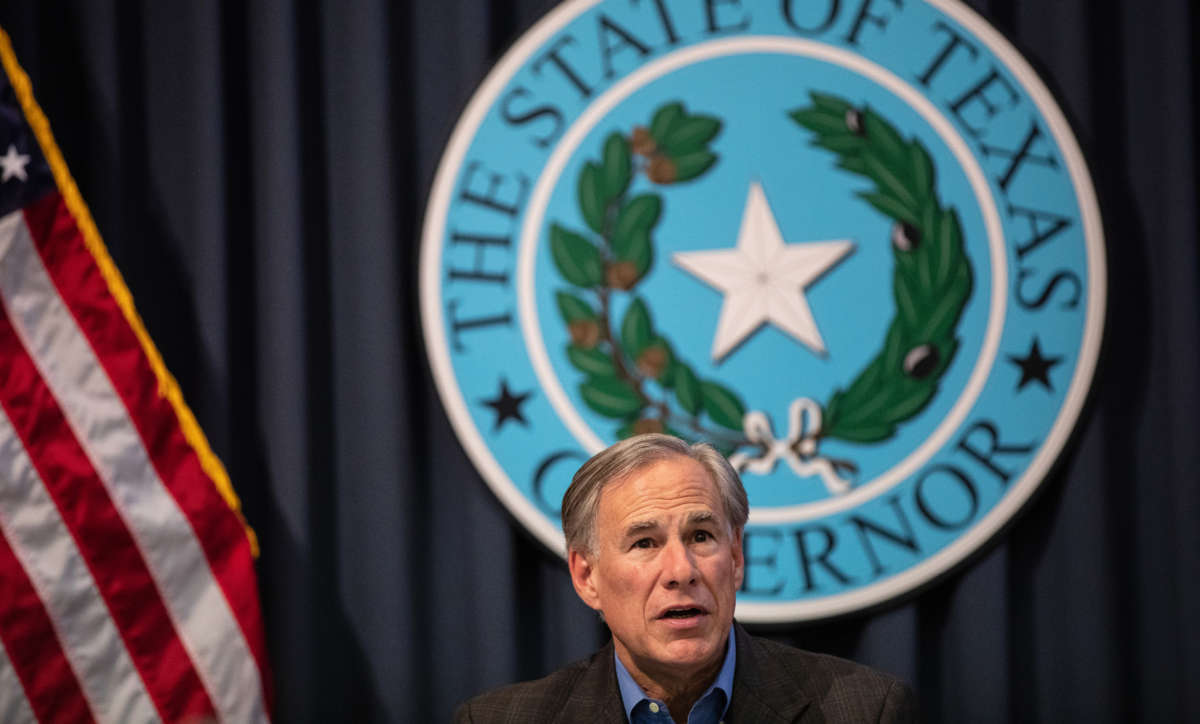Gov. Greg Abbott, the Republican governor of Texas, threatened to arrest Democratic legislators who have left the state to prevent quorum on a bill that would restrict voting rights.
Appearing on Fox News’s “The Ingraham Angle,” Abbott said he would arrest the lawmakers and force them to vote on the legislation he and Republican legislators have proposed.
The bill includes provisions that would ban drive-through voting, ban 24-hour voting, prevent election officials from sending out unsolicited absentee ballot applications to voters, empower partisan poll workers, and add additional and unnecessary restrictions to voting by mail.
Democratic lawmakers left Texas earlier in the day on Monday. In a statement from legislative party leaders, they explained that they did so in order to “refuse to let the Republican-led legislature force through dangerous legislation that would trample on Texans’ freedom to vote.” It is the second time this year that Democratic lawmakers in Texas have left the state in order to block restrictive voting rules changes.
Abbott admitted he couldn’t actually force Democrats to vote on the bill by arresting them until they returned to Texas. “Once they step back into the state,” he said, “they will be arrested and brought back to the Capitol and we will be conducting business.”
Abbott also said that he would keep calling 30-day special sessions until the Democratic lawmakers return to vote on the restrictive bill.
“We have special sessions that last 30 days,” Abbott explained on the Fox News program. “And the governor calls them, and I will continue calling special session after special session because over time it is going to continue until they step up to vote.”
Texas state Rep. Jasmine Crockett, one of the Democrats who left the state to block quorum on the bill, said she’s not concerned about Abbott’s threats because he can’t actually arrest her or other lawmakers.
“The most that can happen,” Crockett said on CNN’s “New Day” program on Tuesday, “is that I can be detained” to be forced to vote.
The governor’s threat to continue issuing special sessions is also an empty one, Crockett added, since he vetoed funding to keep the legislature open through the summer.
“The governor got so frustrated that he vetoed the legislative branch,” Crockett said. “… that means that we can’t function anyway. There is no money after September 1 [to run the legislature]. So he can call as many special sessions as he wants to, but there’s no funding” to hold a vote after that date.
Texas Democrats are now in Washington, D.C. where they plan to encourage lawmakers there to pass the For the People Act, legislation that would address and supersede many of the restrictive provisions being sought in the Texas Republicans’ bill. But the federal voting rights bill faces its own challenges as Republicans in the Senate have already filibustered it once, preventing a vote on the bill.
Several Democratic lawmakers have called for changes to the filibuster rules, or for ending the filibuster altogether, in order to protect voting rights for all Americans, particularly those in states where Republicans are putting up additional barriers to voting in the wake of their 2020 election losses.
“Call me radical, but I do not believe a minority of Senators should be able to block voting rights for millions of people,” Rep. Alexandria Ocasio-Cortez (D-New York) said following the filibuster last month. “But I guess I’m just from that far-left school of thought that legislation should pass when a majority of legislators vote for it.”
President Joe Biden plans to deliver a speech in Philadelphia later on Tuesday to discuss the “moral case” for protecting voting rights across the U.S. Biden “will redouble his commitment to using every tool at his disposal to continue to fight to protect the fundamental right of Americans to vote against the onslaught of voter suppression laws,” White House Press Secretary Jen Psaki said on Monday.
But Biden has not yet called for changes to the filibuster, nor is he likely to do so in his speech on Tuesday, rendering the prospects of the For the People Act being passed as slim as they stood prior to this week.
Our most important fundraising appeal of the year
December is the most critical time of year for Truthout, because our nonprofit news is funded almost entirely by individual donations from readers like you. So before you navigate away, we ask that you take just a second to support Truthout with a tax-deductible donation.
This year is a little different. We are up against a far-reaching, wide-scale attack on press freedom coming from the Trump administration. 2025 was a year of frightening censorship, news industry corporate consolidation, and worsening financial conditions for progressive nonprofits across the board.
We can only resist Trump’s agenda by cultivating a strong base of support. The right-wing mediasphere is funded comfortably by billionaire owners and venture capitalist philanthropists. At Truthout, we have you.
We’ve set an ambitious target for our year-end campaign — a goal of $250,000 to keep up our fight against authoritarianism in 2026. Please take a meaningful action in this fight: make a one-time or monthly donation to Truthout before December 31. If you have the means, please dig deep.
